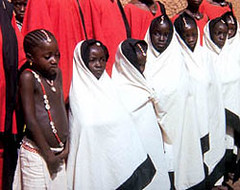While I am on the topic of foreign films (see previous post), I thought I would say a bit about another film Katie and I saw about a year ago, but one which deserves some mention now that I have my blogosphere outlet available for your reading pleasure.
From the Rotten Tomatoes website:
"African cinema's founding father, 81-year-old Ousmane Sembene, continues to be its most fiery, provocative spirit. Extending the strong feminist consciousness that marked his previous triumph Faat Kiné …Moolaadé is a rousing polemic directed against the still common African practice of female circumcision. The action is set in a small African village, where four young girls facing ritual "purification" flee to the household of Collé Ardo Gallo Sy, a strong-willed woman who has managed to shield her own teenage daughter from mutilation.
Collé invokes the time-honored custom of moolaadé (sanctuary) to protect the fugitives, and tension mounts as the ensuing stand-off pits Collé against village traditionalists (both male and female) and endangers the prospective marriage of her daughter to the heir-apparent to the tribal throne."
Moolaade is ostensibly about female genital mutilation (AKA FGM or circumcision), but on a higher level it is also about tradition vs. progress. More than a simple story, it is a bold political statement in favor of modern ideas (especially in regards to the role of women in society). NOW, for those who would assume this is an intense, unsettling film- you’re only half right. Yes, the topic is very serious, there are aspects about the film that are disturbing, and it does include a few upsetting scenes, but overall this is a really enjoyable film to watch, with numerous likable characters (and some really hateful ones, too). It is full of vibrant images of village life, with the sights and sounds of children playing and friends chatting over the simple acts of daily life. It is an excellent film to expose the audience to both the joys and the problems faced in Africa today.
One aspect of the film that is difficult to understand from the Western point of view is that, within the film and in reality, it is occasionally women themselves that support the practice of FGM, as it is considered a major rite of womanhood. To NOT have this done is to be considered a child or an untouchable. Now, to be sure, this reasoning is entirely wrong. However, in the cultural context of some of these societies, it is seen as a necessary practice to allow a girl to become a woman. Now, this film features a cast of women who are rightfully rejecting this line of reasoning, which in the film is supposedly based on Islamic teaching (which, as the film points out, actually does NOT advocate the practice). But the female elders of the village, along with the men, are hard-line traditionalists on this subject and some of its most vocal advocates. Thus the film is a very interesting- and enjoyable- study in cultural clash.

5 comments:
i'll attest to the fact that it was an interesting and enjoyable film. anyone intersted in understanding a brief microcosm for the struggles of a large part of our world would benefit by seeing it.
as an anthropologist, it's hard for me to call the cultural practices of others "wrong". As an outsider to that community, it appears to be "bad", but is very much tied to their identity (as much as male circumscision in Jewish cultures). Body modification/mutilation is nothing new. It's sad, yes. But I think it is something these people are going to have to learn to abandon on there own, without force of well-meaning outsiders. ---blue
Yes, I agree. Though an outside force can surely play a role in affecting change, a culture must itself make any major social paradigm shifts in its practices and values. To swoop in, declare deep-rooted customs of another people to be wrong, change the social fabric of a people (and in some cases forcefully ban a practice) is a very problematic methodology. It does nothing to change a people's cultural mindset. This is not to say that there aren't cultural practices that should be stopped, but rather that there are ways that are more effective, respectful, and long-term than forceful social change. Changes don't often happen quickly, and when they do, there is often major upheaval in said society.
With that being said, I think that there ARE some practices that are wrong, or at least (as I stated in this post) some faulty lines of reasoning that support these practices. Importation of new ideas, lending support to social movements and organizations trying to improve living conditions, and above all else better educational opportunities are often the better and effective way to create social changes.
You would really like this movie, by the way. CHeck it out. Thanks for commenting, Schmoo.
agreed. The "best way" to instigate change w/o force seems to be the question entirely. Certainly, this practice is not good. But it definitly is tied to their identity. It sucks. It's kind of like slash and burn agriculture in Madagascar; it's destroying the environment...but it is considered distinctly part of "who they are". There have been several articles written on female circumscision (in various areas). I think you would find them interesting (even though you are a sociologist, ick). I wish I knew the answer...but alas...I suck.
AH, I want to clarify a point about this film, in response to a query from my mother today on the phone: This film is a work of fiction- perhaps the publicity still I chose to post is a bit too realistic looking. Though I think documentaries are vital, this is not one, thus in watching it you won't see any real unsettling events, per se. Like I said earlier, it is intense at times because it is based on a real truth, but it is nonetheless a very enjoyable little film.
Post a Comment